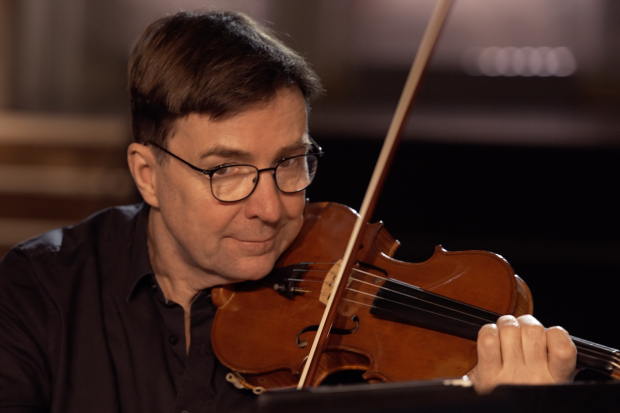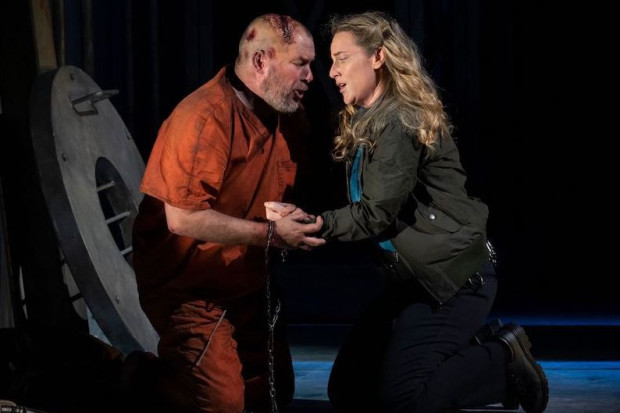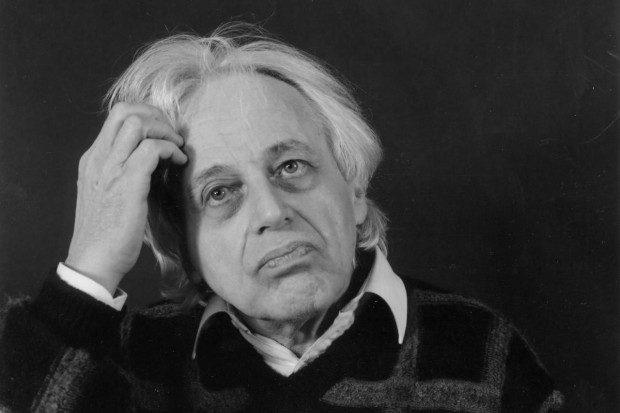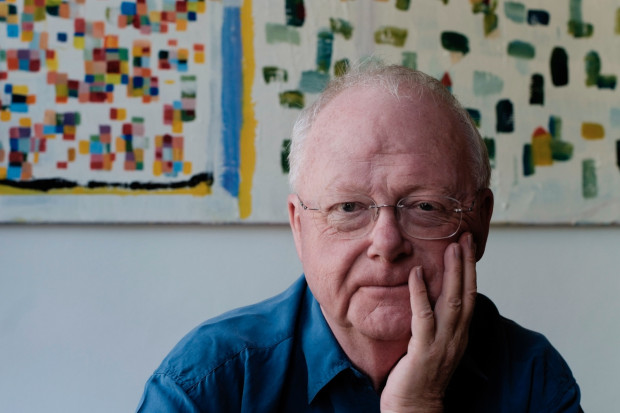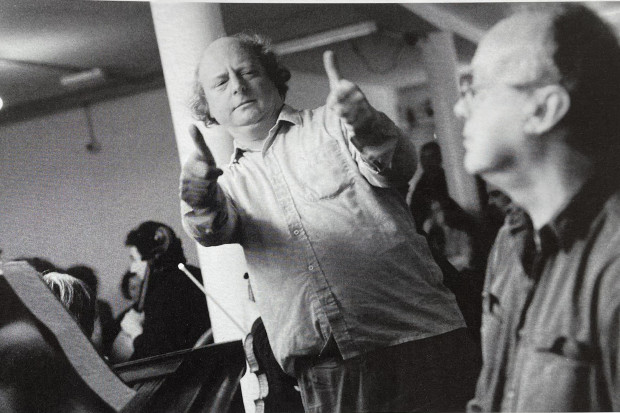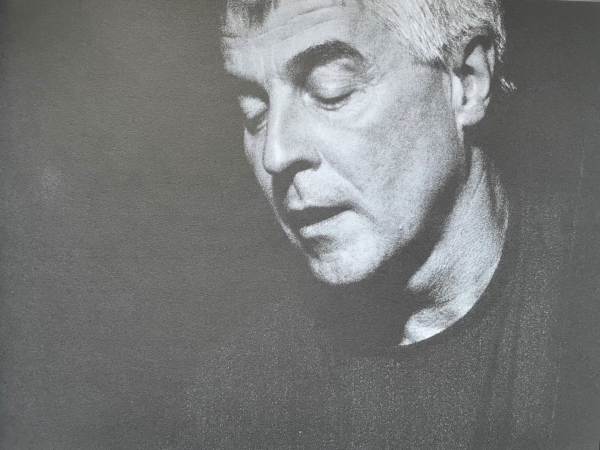
Barry Guy (Photo: Lucy Clarke)
'The Deepest Need to be There, Communicating'
In March 2000 the contemporary music series Mostly Modern (now known as Music21), of which I am Director, presented a festival of so-called free-improvised music. The event was headed up by London bassist Barry Guy who was somewhat of a regular on our listings. Over a period of three days we saw evolve one of the most extraordinary ensembles working today – the Barry Guy New Orchestra (BGNO). We had with us that weekend many of the leading exponents of this genre from all over the world – saxophonists Evan Parker and Mats Gustafsson, trumpet player Herb Robertson, Trombonist Hans Baur, Tuba player Per Åke Holmlander, New York-based pianist Marilyn Crispell, drummers Paul Lytton and Raymond Strid, and the clarinettist and saxophonist Hans Koch. With this line-up the festival presented a series of solo, duo, trio and quartet performances, a number of fascinating workshops, and culminated on the third day with the inaugural concert of the BGNO giving the world première of Guy’s Inscape- Tableaux. The result was a weekend of extraordinarily intense music making.
From a Director’s point of view, it was one of the most successful events presented by Mostly Modern in its (then) ten-year history with a full capacity house and standing room for about one hundred people. The two published reviews of the event highlighted the divisive effect the concert had. While the Irish Times review praised the BGNO for its ‘heart-speeding, moving, exhilarating performance’ offering music that ‘immediately established an intense involvement with the vitality of the moment’ establishing ‘a reality of expression almost shocking in its immediacy with sounds which emerged from the deepest need to be there, communicating’, the Sunday Tribune’s review, with the title ‘A monster of musical sin’, not only attacked the music as ‘cacophonous’ and for being ‘a decadent artistic mistake of the 1960s’, but also attacked ‘those propagating’ the event as being ‘motivated by arrogance and greed’.
Leaving all this cabaret aside, I think the festival had a profound influence on many of the young, interested musicians who attended all the concerts and workshops that weekend. It certainly influenced my own relationship to performance and I have subsequently committed my own ‘monster of musical sin’ by making a free-improvised CD recording with guitarist Mike Nielsen (Evolution).
For the first concert of the newly re-incarnated Music21 series last November, I decided to invite Barry Guy back to Dublin along with Swedish saxophonist Mats Gustafsson for a concert at J.J. Smyth’s. The following interview with Barry Guy took place on the day of the concert.
Benjamin Dwyer: Can you give me some idea of your musical upbringing? Were you born into a musical family and at what stage did you feel that music would be the necessary ingredient in your life?
Barry Guy: I would say that the family was not musical, though mother played the piano a little. I had a good upbringing in school – they encouraged music. There we had what’s best described as a military band and the guy who wrote the music for it made arrangements of Beethoven and Schubert, Johnny Dankworth, and I suppose some Bill Russo, so it was a rather wide musical education but for me it was all just interesting music, there were no barriers set up and we just played the music. I started off on trumpet, and then I doubled in clarinet, then went to valve trombone, then to horn, then to euphonium…
BD: You were moving down all the time.
BG: Yes! And then we had a little trad band. In those days it was Acker Bilk. Chris Barber and Kenny Ball were in the charts for God’s sake, and we were a clone of them really. So as an aside to the school orchestra and its public events, we had our little jazz band. Other than playing valve trombone, I was allowed to play a one-stringed tea-chest bass. That’s where the bass end of things started up. But then I got fed up playing just one string and thumping away à la Skiffle (that was where the tea-chest bass came from). I persuaded my parents to spend seventy-five pounds to buy me a Czechoslovakian plywood bass. And all I remember was asking the lads ‘now I’ve got four strings, which ones do I play?’ Most of the time I was walking around with a piece of cardboard under the strings trying to work out which notes were which. As well as the thing at school, we had this rather interesting and, I suppose, a fortuitous experience in that the guitar player in our band, his father owned a liqueur store, an off-licence, and we used to go and play at the Hot Club of London in Woolwich, and quite often the guys who had been playing, who were professional Dixieland players, would come back to the off-licence, and we were allowed to jam with them. This was one of the best educations I could get. We had Champion Jack Dupree back there, Sonny Boy Williamson popped in once and so we were playing blues with these famous old masters.
BD: So pretty much from early on you were always improvising?
BG: Yeah. That was pretty much it. With no particular direction except that we were working through Dixieland and our clarinet player had a great love of Benny Goodman and Sydney Bechet and that repertoire then came in. I remember there was one very important thing for me. I suppose you could say it changed my life. When we were in school one lunchtime, we were working on some of our Dixie things and a friend of mine, Bernhard Living, who was with the Mike Westbrook Orchestra as a saxophone player, came in with some Charles Mingus. And he put it on the record player and said we should be playing this music and not Dixie. Some of the guys said ‘no, we don’t want to play this rubbish’, but I immediately heard this as something very important, so I said I want to play this, and we had a huge fight in the class room and the record player went over and there were bloody noses! It was really serious. BD: That was your first ideological battle really. BG: Absolutely… and Charles Mingus won!
BD: So all the time you were in school you were learning the notes in the school orchestra, getting that training, but you were out in the bars at night.
BG: That’s right. We did working men’s clubs in south-east London, little jazz clubs. We were thirteen, fourteen. We were hardly allowed in the pubs, but that’s what we were doing. We were immersed in the life of being musicians.
BD: So had it become, even at the age of thirteen, a life thing?
BG: Yeah, in a way. It was the thing that we enjoyed the most. We were in south-east London which was a highly industrialised area, and our prospects were either go into the Charlton Athletic Football Team, or go into the factory. Most of the guys in my class decided they wanted to be a footballer, including me, actually. But in a way the music took over and I found an interest there, as well as art. We had a very good art teacher there and I was very interested in painting. We also had a very good technical drawing teacher and I got very interested in technical drawing. So my ambition was either to go to art college or go into architecture or something like that.
D: But you have in fact played in most of the good London orchestras, so did you become a professional classical musician or did you go into architecture or art?
BG: Well I did three years with architects in London, which was mostly on restoration architecture. They took me on, basically because I could sharpen a pencil. We had to do many preparation drawings and paintings for clients and I enjoyed that. But while I was doing that I was taking evening classes at Goldsmiths College in composition with Stanley Glasser – a South African composer who was Professor of Music there. And this is where I started to learn about the ‘other’ music – Stockhausen and Boulez. Xenakis came later I think… Penderecki… as well as a little bit of the classics… Beethoven and that. So there was a tug happening already. I was in the architects, I was doing more theoretical work at the composition classes, but I was also playing in the chamber orchestra there. I suppose that’s were I learned to handle the craft of playing chamber music. I took some other courses privately. Basically the day was drawing; the evening was music… until the crunch point came. I was talking to a bass player and I said to him that I would really love to play professionally and he said ‘the way you play, you could’. I said ‘what do you mean?’ He said ‘go to one of the colleges in London’. So I took private lessons with Jim Merrett who was Principal bassist of the BBC Symphony Orchestra. He was very good, he allowed me to develop in a completely free way. It wasn’t pedantic teaching. It was interesting because when I finally got to the Guildhall, Dave Holland was there, and Chris Lawrence, who’s a great bass player.
BD: At what stage did the free improvisation come in? What was that crunch point?
BG: Well that was an interesting one because when I took evening classes at Goldsmiths College we were encouraged to write a piece at the end of the first year. Bernard Living was also in this class. He was one of these guys who knew a lot about the American avant-garde – he knew all about the painters, the dancers… Merce Cunningham, he knew all about the Rauschenbergs, he just had a mercurial knowledge about everything. I wrote a piece which had saxophone and trombone cadenzas in it which were meant to be free. Bernard was supposed to play the sax cadenza but he decided he wanted to conduct my piece as it was a bit difficult. So I heard of a guy called Paul Rutherford who was a trombone player. I found him in a pub and asked him to play my piece. He introduced me to the saxophonist Trevor Watts. So Paul and Trevor played in the piece, which wasn’t a great piece, but it was my first. About two weeks later I got a call from the drummer John Stevens who asked me to come up to the Little Theatre Club to play with Spontaneous Music Ensemble. At that time I was playing a lot of modern jazz and playing with Bob Downes. I was in the resident rhythm section in Ronnie’s place seven nights a week. Then this came along and I had no idea what was in front. It seemed like an endless tunnel of darkness. I’d no idea where it was going except that everything was free. I suppose it was out of the Ornette Coleman/Eric Dolphy side of things. For me, the loss of freedom was scary.
BD: There was too much freedom in a sense?
BG: At that time, yeah. It seemed to be because a lot of the discussion that we had within the group… (let’s say analysis of pieces after a performances) was really head-banging – to find out our relationship to each other, to the group, it was all a question of balance, a question of understanding what we were supposed to be doing.
BD: It’s interesting that you mentioned this question of balance. If we accept that composition comprises an equal combination of structure and content, in other words, composition is a merging of the abstract material to the archetypal form, how do you feel that these aspects are balanced in your improvisations? Is there a danger that expression has been liberated at the expense of form?
BG: It’s been interesting for me within the sphere of free improvisation that there is a high degree of control, of instrumental control. It is very important to be able to immerse yourself in the music and not allow the expressionistic aspects of it or the expression of the will take over from the balance of structure. Structure is very important, but on the other hand, you have to allow the music take you and your fellow travellers to wherever it wants to go, but with degrees of control. I have always advocated a very, very strong technical facility on your instrument before you get involved in this type of music because my feeling is that you have to allow the freedom of the body enter into the spirit of the music. So the less baggage you have about trying to play things the better it is. If you have a good technique you can allow all the functions of the brain and the structures to emerge, and also, to be aware of your fellow musicians. It is this precarious balance of ego and being humble at the same time.
BD: When talking of the newly developing free improvisation movements of the late sixties like New Phonic Art, Luciano Berio once described free-improvising musicians as perhaps being ‘fluent in inventing socio-political alibis but are in most cases quite incapable of evaluating and analysing themselves in relation to any historico- musical perspective… improvisation presents a problem: above all, because there’s no true unanimity of discourse among the participants, only, once in a while, a unanimity of behaviour.’
BG: I know this phrase… and Xenakis has said the same. Boulez has said the same. Ferneyhough says it’s an unstable chemistry. All the great composers that we know of have suggested that free improvisation is an unfavourable musical manifestation. I obviously disagree completely. I think that these guys haven’t heard what we have been doing. If you take the Evan Parkers, the Mats Gustafssons, and see the way they have developed their instrumental facility, that is one thing, but what they have also developed at the same time is a complete control of the flow of the music and the structure of the music. I don’t think that Berio, Xenakis or Ferneyhough have really heard any successful improvisation.
BD: So is it that they just don’t get out enough or is it that contemporary composers are very cautious about relinquishing control?
BG: I think both.
BD: You mentioned Xenakis there, and I remember when you played in Dublin for the Mostly Modern Series you gave a wonderful performance of Theraps. You worked with Xenakis. What was that like?
BG: Well, for me it was one of the most stunning opportunities to find out how a piece works. Obviously, I had some ideas about how to play the piece, but it was very good to actually go over to Paris, knock on his door and say ‘Iannis, can I play the piece to you?’ I went there and played the first couple bars of the piece and he shook his head and said ‘no, this is impossible. You’re not playing my piece’. So we discussed articulation, what his expectations were. At that point I discovered that there was one fundamental instruction left out of the nomenclature at the beginning of the score which was supposed to articulate the music. To cut a very long story short, we met three times – twice in Paris and once in London. I was building up the piece and each time we discussed some of the inherent problems of the work. I did my own programme note for it and I sent it to him. He said you’ve understood the piece perfectly. I played it to him. He said ‘you’ve got it’ and later on he said ‘you’re my favourite performer of Theraps’. Which is great. Now, they still use my programme note at the beginning of the score. What was interesting for me was to understand the degree of freedom that one was allowed inside the piece. Obviously it’s a through-composed piece, but there are certain things (as I said to him) that are almost impossible to do.
BD: The glissandi in opposite directions…
BG: Yeah. I said I’m having to make some fixes here to get these glissandi to cross over in opposite direction. What I discovered was that I think he looked at the bass from the front. So if you put your fingers on the fingerboard at the front, you can cross over in this crab-like movement up and down the strings. When you’re behind the bass, it’s a different thing because the arm’s in the way, everything is in the way.
BD: But it’s a piece that combines huge formal complexity with the freedom you would be used to.
BG: Yeah. I was naturally attracted to this music because if you go into this piece and do what he says, i.e. exaggerate the dynamics, exaggerate the speed (both directions), it takes you to the limit of your physical capabilities. When I first started playing it my arms were shaking. And this is why I thought ‘Theraps – now what does that mean? Does it mean therapy?’ But I’ve learned to control the muscular exertions, and if you go for it, it turns from being a piece that is slightly dry to being a glorious piece of strength in music and expression. For me, it takes me almost into the territory of improvisation. He wouldn’t accept that, improvisation is not on his agenda. But that’s my feeling and not his.
BD: Do you think that it’s possible to teach improvisation?
BG: Oh the big question. Yes and no, it depends. There are a lot of side issues here. It depends on the person who wants to learn improvisation, how they want to do it, and what area they want to be in. Improvisation is a huge subject. When somebody rings me up and asks can I teach him improvisation I say no. I can’t teach you improvisation. I can only teach you how to possibly appreciate how to do something, how to be free. For some people I have to suggest leaving behind regular technique for instance. Maya (Homburger) my wife, for instance, plays Baroque violin and we do some improvised passages in some pieces. But it took her a long while to push aside the intensely rigorous training she had about fingering and patterns. There are a lot of taboos to break before you can become free, and some people don’t want to be free. Some people want to play jazz standards and I say, well I’m not your man.
BD: I think the shift from interpretative skill to creative skill is too big a leap for many people.
BG: I think so. It is a hard one, but I’ve been lucky in that I’ve come this very strange route – baroque music, contemporary music, improvised music. For me they’re all glorious aspects of music and I’ve been fortunate to have been able to do all of them, and with professional ensembles to boot. But it was essential all the time to keep your mind open – listen, look, hear, follow your instincts, follow your friends, just keep your mind totally open – it’s the only way to do it.
A review of the Barry Guy/Mats Gustafsson gig at J.J. Smyth’s appears in the live reviews of this issue
Published on 1 January 2007
Benjamin Dwyer is a guitarist and composer and the author of 'Different Voices: Irish Music and Music in Ireland'. He is Professor of Music at Middlesex University's Faculty of Arts and Creative Industries.













